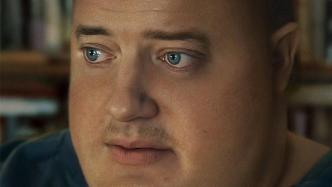
Editor's note: On March 12 local time, Brendan Fraser won the 95th Oscar for Best Actor for his outstanding performance in the movie "Whale".
Would the movie still work if Brendan Fraser's Charlie wasn't so fat?
In the vision of The Whale (2022), the protagonist Charlie is a floating spectacle. His body was like a whale on land, stranded in the apartment room, panting and struggling.
The ugly spectacle of obesity, combined with the hero's own experience—repeated injuries, divorce, and the stress of alleged sexual abuse by powerful men—turned Fisher from action star in The Mummy series to nearly missing gas star. On and off screen, the ill-fated fate of actors and characters constitutes a trait favored by Hollywood, pushing "Whale" into the hot spot of awards season.
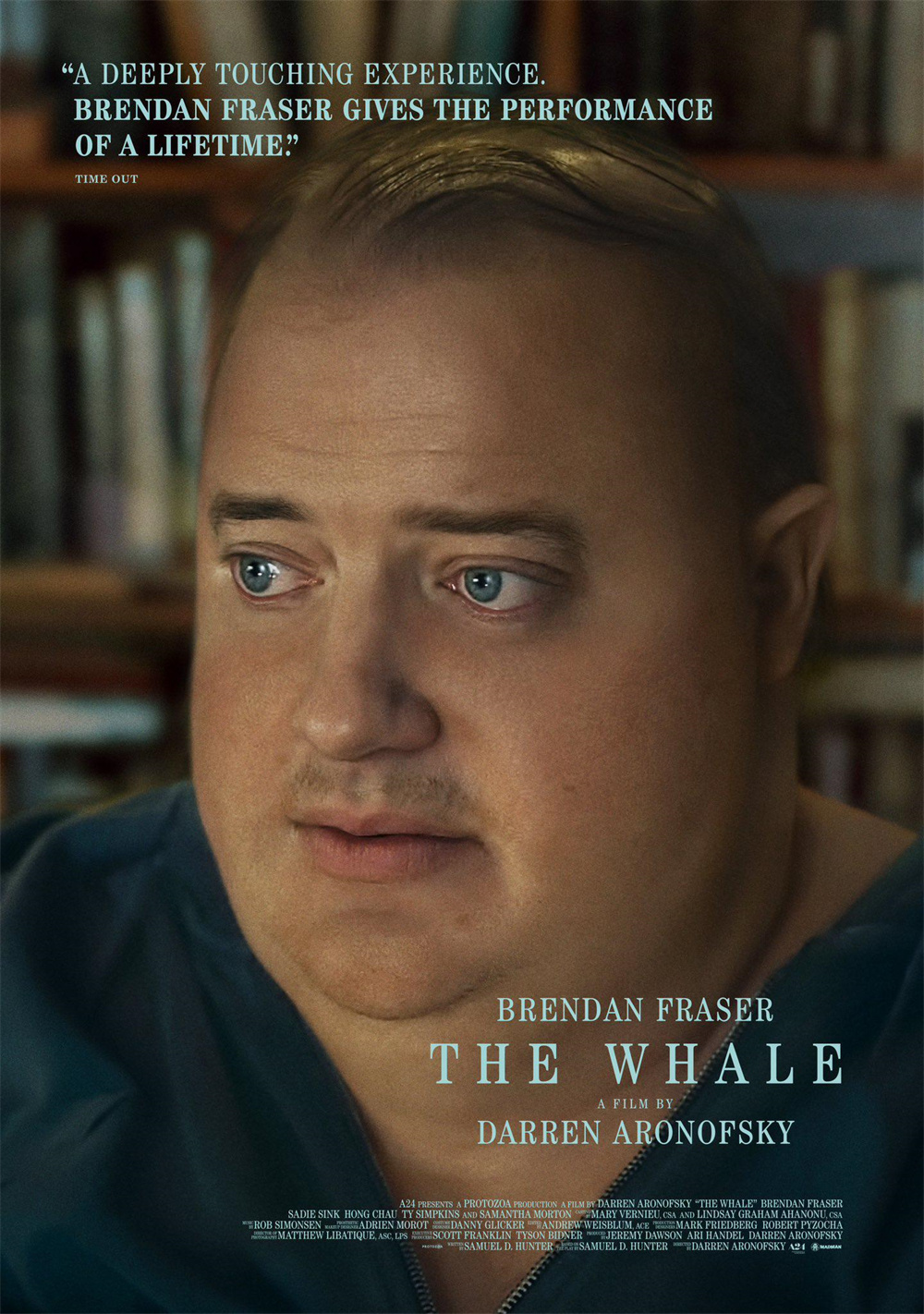
"Whale" poster
Director Darren Aronofsky is known for showing the dark mind trapped by obsession/addiction, "Requiem for a Dream" (Requiem for a Dream, 2000), "The Wrestler" (The Wrestler, 2008) ), "Black Swan" (Black Swan, 2010), nothing else. "Whale", adapted from Samuel D. Hunter's play of the same name, is a work he has been pondering for ten years, and it is also a continuation of the previous pedigree.
Charlie, a teacher who teaches writing classes at the university, "is born with a big size". After the death of his same-sex lover, he indulged his appetite and ate into a fat body that was presented by the camera with curiosity and amazement. Charlie misses his lover, Charlie teaches seriously, Charlie is gentle and kind, and Charlie's eyes are as clean as a herbivore. In American movies, obesity often appears alongside psychopathy and cruelty. Charlie, uncharacteristically, lives temporarily in this skin like an angel. Sure enough, Charlie finally completed the ascension dramatically.
In the last days of Charlie's life, his nurse friend Liz (Zhou Hong), missionary Thomas (Ty Simpkins), daughter Ellie (Sadie Sink), ex-wife Mary (Sadie Sink), Mantha Morton) came to visit one after another, and the pizza delivery brother Dan (Merci Staren) and his students saw his true face.
In a small enclosed space, everyone is talking to each other. Through conversation, we learn that Charlie rejects religious comfort and salvation. But this does not affect "Whale" has a strong religious complex. It invites viewers, and visitors to the apartment, to watch the final stages of Charlie's long self-destruction. Despite rejecting Christ, the film still moves toward redemption in the end. The conditions of salvation are: uncontrollable mutual care between people, and honesty.
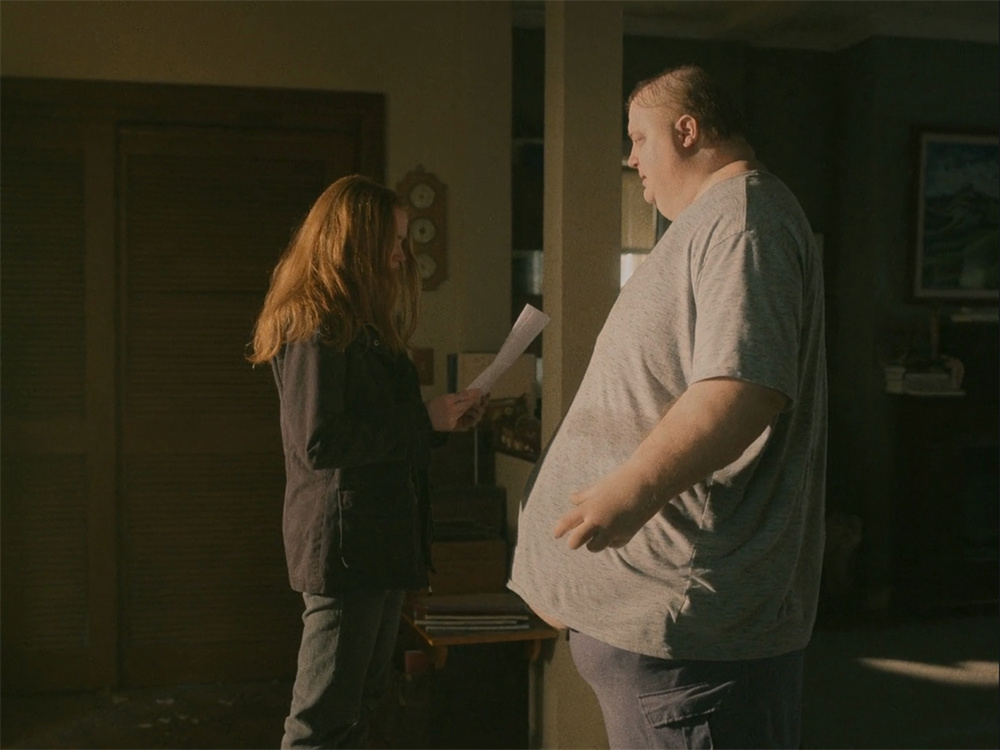
"Whale" stills
It's hard to say that Charlie did these things, only that he, dying, inspired them in those around him. It does touch on some deep stuff, but it's something the movie feeds on the viewer, more like a lecture than an experience. Charlie, the behemoth in the room, walked around the room from beginning to end, but never belonged to this space. It was as if he had been waiting for the final sublimation, bringing the expected touch to the audience the moment he left the ground.
Brendan Fraser becomes Charlie thanks to masterful makeup and special effects. Despite his flawless appearance, Charlie still looks like a patchwork product, with all kinds of unnaturalness. He's a fat man, but he's like a saint. He's not lazy (hard working and responsible), not greedy (except for food), not very selfish, kind and polite, just sad. Although he left his wife and daughter for her boyfriend, he paid alimony on time and in full, and has always cared about his daughter's growth. There are few such gentlemen and gentlemen in the crowd. It's not that I discriminate against obesity. I firmly believe that obesity must be accompanied by evil. Instead, I hold the same expectation as the movie, hoping to know what kind of psychology people have when they are addicted (here is junk food).
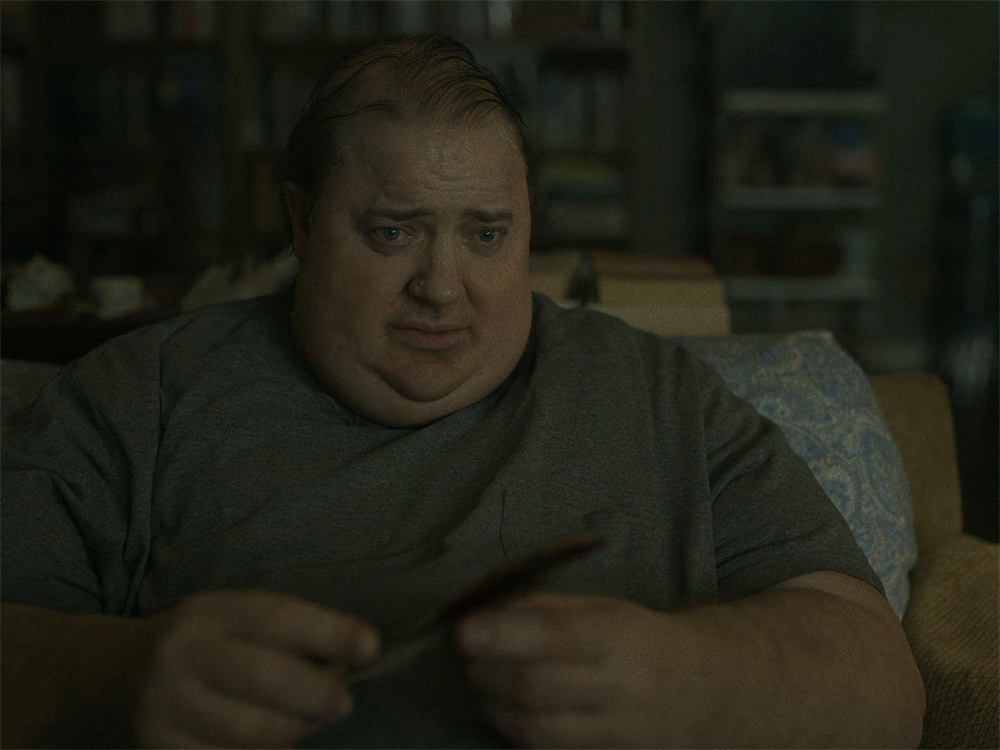
"Whale" stills
It's a pity that "Whale" explores the characters' psychology very superficially, making Charlie just a slowly moving suffering display board, illuminating other characters through conversation.
After filming, the lack of heart in this character becomes unavoidable. The death of his same-sex partner Allen should have become a passage to Charlie's heart, but in the end only the camera shot the symbolic door leading to the dark empty room. The relationship between Charlie and Allen and Allen's death were hastily skipped, and in the end, Charlie's self-abandonment journey was not given.
Perhaps because he was aware of his shortcomings, he made a remedy to enrich the character's heart, making Charlie suddenly obsessed with "honesty" when he was dying.
Although the foreshadowing has been laid at the beginning, this obsession is still very abrupt. Charlie is not a man who is very honest with himself and others. He thought he cared about his daughter and saved all his money so that his daughter could live a decent life in the future, but he didn't even know that his (ex) wife and daughter had moved away long ago. He lied to Liz that he had no money, causing her to be stranded in the snow (the car broke down) in order to buy daily necessities for him, but he did not help her financially.
Charlie's dishonesty, that is, the level of ordinary people, is not a big villain. It is not impossible for such a person, at the end of life, to develop a desire for honesty. The desire for honesty, it is hoped that it will advance to the heart of the characters. But inward forces are immediately pushed outward. Charlie did not reflect on his own life. He really is like the whale in Moby Dick, only responsible for reflecting the sorrow of others.
But can Charlie really be another Moby Dick? When he put forward the highest request for honesty, the reactions of the people around him were too fake, and the director's intention fell through again.
Charlie wrote emails to students in a fierce tone, telling them that the highest point of writing is to write the truth. For the first and last time, he turned on the camera in class and let the students see his whole body. The students responded by reporting the teacher's inappropriate behavior to the school (referring to the rudely written email); showing collective expressions of shock and disgust to the camera; Example: I am ready for a life of mediocrity).
The director wants to use the students' reactions to deepen Charlie's suffering and let him continue to accept the trial in the last moments, but it is a two-way failure.
"Honesty" was supposed to be the pearl spit out of Charlie's clamshell, a swan song to get authentic feedback. His daughter Allie is that pearl, that swan song. But Ellie is another character who follows the trend and follows the trend. She is a "Euphoria" girl, with hatred, chaos, and destructive desires forming the evil part. Intelligence and penetrating ability confront "evil", and the east wind and west wind take turns gaining the upper hand.
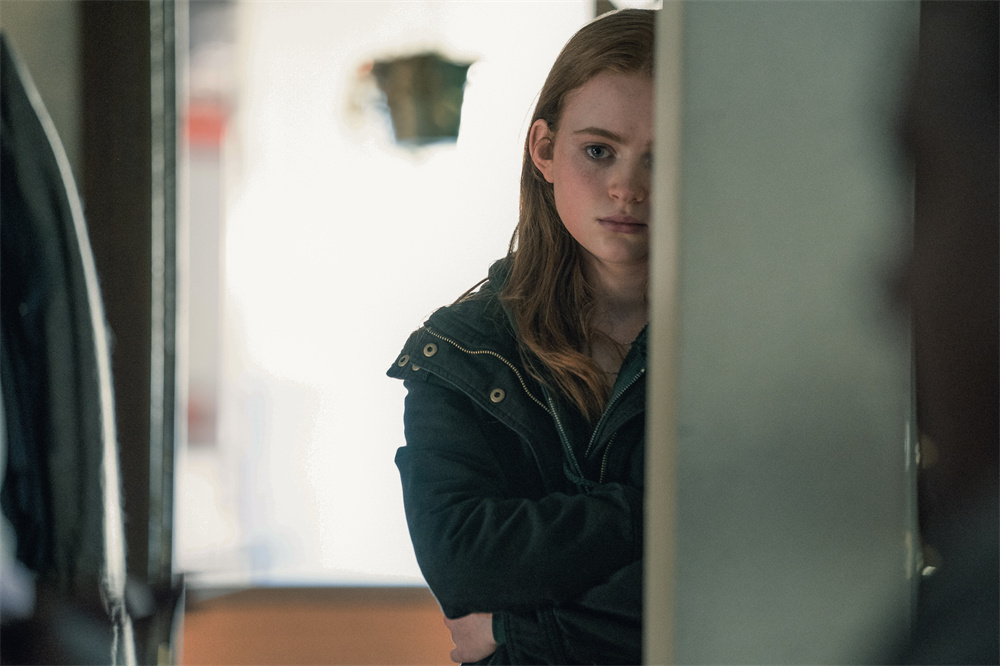
"Whale" stills
This type of girl character is new and interesting at first sight, but it is scary if there are too many. The screenwriters began to go astray, comparing each other whose "Flower of Evil" was more venomous in speech and more extreme in behavior. They are a spectacle poured out of a module, gradually losing their humanity, changing from pearls to dead fish eyes.
Back to the original question: would this movie have been an Oscar hit if Charlie hadn't been so fat?
The multiple reasons for Charlie's obesity and Alan's death, the relationship between the two of them, Charlie's desire for "honesty", these three important questions have been covered up by the "standard answer". The avoidance of the core issue makes the characters around Charlie can only respond to the spectacle instead of a living person, resulting in a state of collective distortion and weightlessness.
However, the other characters and Charlie's rivalry have not all failed. Between Charlie and Liz, there is a sense of realism rarely seen in the film. Liz's care and attachment to Charlie come partly from friendship and partly from the memory of her brother—Charlie's late lover was none other than Liz's brother Ellen, and her pain and anger are real.
Readers can understand why the white whale can reflect the tragedy of human beings. But it is difficult for the audience to understand how Charlie directly or indirectly makes people around him admit theft, weakness, and emptiness, face himself honestly, and accept the suffering of life, so as to obtain redemption. Just because, is he a sad fat man? What if he wasn't that fat?


